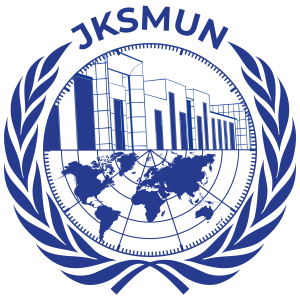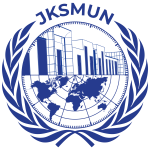- OUR SCHOOL
- GENERAL INFORMATION
- EDUCATIONAL PROGRAMS
- SCHOOL FACILITIES
- STUDENT SERVICES
- العربية
The subject “Redefining Order” invites participants to examine the changing landscape of global governance and international relations in the face of serious issues like as climate change, geopolitical upheavals, and socioeconomic inequality. This subject challenges participants to critically evaluate existing power and authority structures and discuss how they may be reinvented to promote inclusivity, sustainability, and resilience.
Delegates will examine rethinking norms in diplomacy, conflict resolution, and collaboration, with the goal of finding new solutions to today’s challenging issues. “Redefining Order” aims to inspire a communal approach to a more just and secure society for future generations by encouraging discourse on alternative models of order that prioritize human rights and equitable development.

This year, JKS is hosting it’s 13th annual Model United Nations (MUN) conference.
The conference will be held from 5 to 7 December 2024


MUN conferences regularly simulate the bodies of the United Nations,
the European Union, government cabinets, and regional bodies. These
are called committees. Every delegate will be sorted into the committee
of their choice.







Topic 1: The impact of Western Intervention in the Middle East and North Africa Region
Topic 2: Strengthening Sudan’s post-war economy with support from the global community
Topic 1: Regulation and oversight of autonomous weapons systems
Topic 2: International cooperation in managing orbital debris and space traffic
Topic 1: Mitigating the threat of biological weaponry
Topic 2: Countering the threat of improvised explosive devices, landmines, cluster munitions, and other explosives
Topic 1: Strengthening international cooperation to counter cybersecurity threats
Topic 2: Enhancing disaster preparedness and response strategies worldwide
Topic 1: Discussing legal methods to redistribute displaced historical artifacts
Topic 2: Establishing laws for transboundary bodies of water
Topic 1: Revisiting the clauses and terms of the Treaty of Versailles and their impact on the German motherland.
Topic 2: Addressing the invasion of Czechoslovakia following several breaches of the treaty of Versailles.
Topic 1: The situation in the Democratic Republic of Congo
Topic 2: Ensuring the lasting peace between Azerbaijan and Armenia
Topic 1: Addressing the rise and regulation of cryptocurrency
Topic 2: The effects of hyperinflation and its socioeconomic consequences in Lebanon
Topic 1: Addressing the ethical implications of genetic engineering and biotechnology
Topic 2: Combatting climate change: strategies for environmental conservation and sustainable development
Topic 1: Ensuring access to humanitarian aid and protection of civilians in conflict zones
Topic 2: Human rights violations during the Yemeni Civil War
Topic 1: Improving public health: implementing initiatives to advance global medical literacy
Topic 2: The implementation of low-cost healthcare centers to address medical inequality in refugee settings

